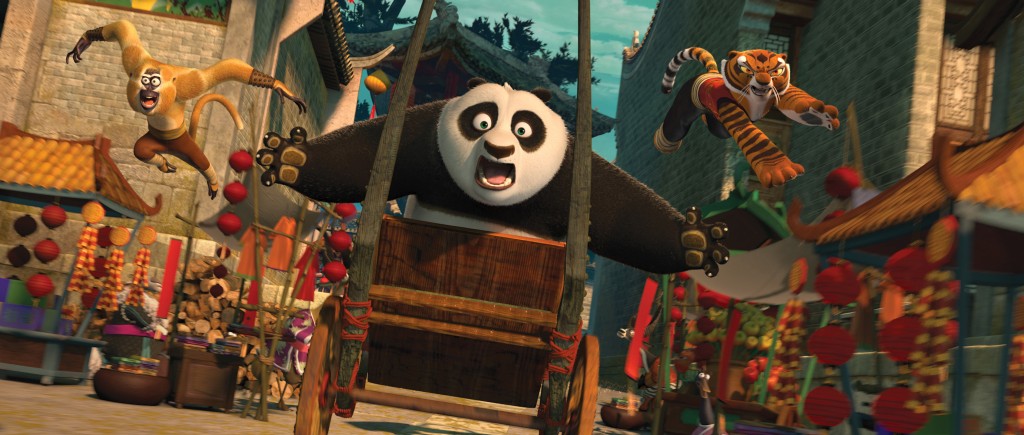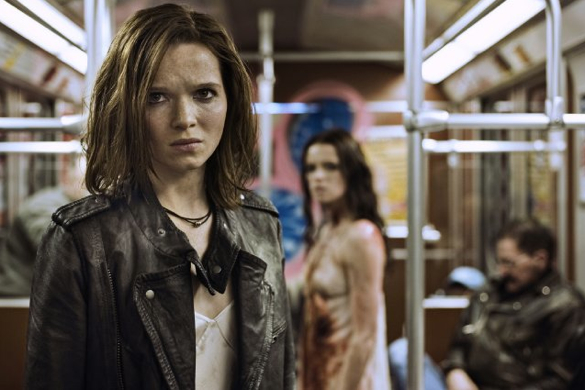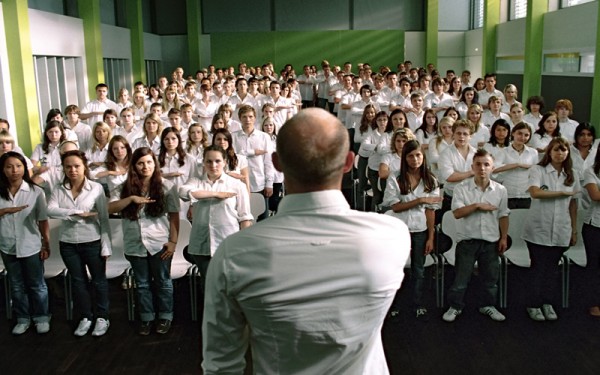Wed 25 May 2011
Street Fighting Panda
Posted by Ethan under Film Review, NYC Film Critic
Comments Off on Street Fighting Panda
Kung Fu Panda 2
Directed by Jennifer Yuh Nelson
Written by Jonathan Aibel, Glenn Berger
Starring Jack Black, Angelina Jolie, Dustin Hoffman, Jackie Chan
***
When they first opened their doors in the late ‘90s, DreamWorks Animation initially tried to match Disney and the newly ascendant Pixar prestige picture for prestige picture. Than a little blockbuster called Shrek came along and the studio promptly developed a new M.O.: creating pop-culture savvy comedies packed with big-name vocal talent. 2008’s Kung Fu Panda was one of the more successful of their post-Shrek efforts, a fleet-footed and cheerful send-up of chopsocky martial arts movies starring a menagerie of cute animals led by the titular kung fu fighting panda, Po (voiced by Jack Black).
If you enjoyed his previous adventure, Kung Fu Panda 2 offers more of the same, this time dispatching Po and the rest of the Furious Five—which includes stern Tigress (Angelina Jolie), clever Mantis (Seth Rogen) and goofy Monkey (Jackie Chan)—to combat the villainous Lord Shen (Gary Oldman), a strutting peacock with a lust for power and the right weapon to seize it with. In between cleverly choreographed fight sequences—which put many recent live-action summer blockbusters to shame—the orphaned Po learns more about his heritage and struggles to master one of his sensei Shifu’s (Dustin Hoffman) most challenging lessons: finding “inner peace.â€Â Director Jennifer Yuh Nelson (one of the rare female directors to oversee a big-budget animated event movie, a feat that Pixar’s boys club brain trust can’t claim) keeps the action swift and the tone light, but the movie lacks both the subtle grace notes and compelling characterizations that would make it a richer viewing experience. Compared to Pixar’s Toy Story 3 or even DreamWorks’ own How to Train Your Dragon from last year, Kung Fu Panda 2 is awfully slight. Not every animated film needs to touch on weighty themes to please its target audience of course, but the ones that do so successfully often have more replay value with both kids and their parents than an insubstantial programmer like this. (Since Kung Fu Panda 2 is technically a kids’ movie, I should mention that I took my four-year-old son and he enjoyed himself, although he wasn’t a fan of the waves of “scary†wolf henchmen that keep attacking our heroes. He also could have cared less about the 3D—which is actually well employed here, if not essential to one’s overall enjoyment of the film—and opted to spend much of the movie with his glasses off. So parents, keep that in mind when deciding whether or not to shell out the extra dollars for those pricy plastic bifocals.)
Kung Fu Panda 2 opens in theaters on Friday.
——————————————————————————————————————————————————————————-
We Are the Night
Directed by Dennis Gansel
Written by Jan Berger, Dennis Gansel
Starring Karoline Herfurth, Nina Hoss, Jennifer Ulrich
**1/2
The Wave
Directed by Dennis Gansel
Written by Dennis Gansel, Peter Thorwarth
Starring Jurgen Vogel, Frederick Lau, Max Riemelt
***
Further proof that the current vampire craze extends beyond these shores, the German genre entry We Are the Night (directed by Dennis Gansel, who has two movies opening this weekend in theaters and on VOD) cannily attempts to cross the usual bloodsucking antics with Sex and the City-style female bonding and some gritty police drama a la the Miami Vice movie. It doesn’t all hang together, but Gansel hits on some interesting ideas now and then. The plot finds a trio of female vamps forcibly recruiting a new member, street kid Lena (Karoline Herfurth, from Tom Tykwer’s underrated 2006 bit of insanity Perfume: The Story of a Murderer) into their crew. Initially, joining the ranks of the undead seems like loads of fun—having been alive for several decades now, the girls have amassed quite a fortune, which allows them to live in luxurious surroundings, buy the finest merchandise and spend every night partying at the hottest clubs. But the good times can’t roll forever and inevitably trouble arises in the form of a dogged cop that’s on Lena’s trail. After a particularly sloppy kill, the group is forced to go on the lam and they suffer some heavy losses along the way. The movie’s strongest set-piece finds the fugitives careening through the streets while sunlight streams through the numerous bullet holes perforating their car, while its most emotionally affecting scene is a quiet moment where one of the women visits the child she abandoned some eighty years ago, who now lies dying in a nursing home. Surrounding these two striking sequences is a more generic film that boasts strong production values, but uneven performances and storytelling. (The vocal performances in the dubbed version I screened are also noticeably sub-par. If you can, try to see it with subtitles.) Still, as vampire movies go, it’s a damn sight better than Twilight.
Hansel’s other film, The Wave—which was originally made in 2008—is a more interesting and provocative effort. Set over the course of a single week, the movie depicts the unintended consequences that result when an inexperienced teacher/water polo coach (prolific German actor Jurgen Vogel in a strong star turn) decides to teach his students about the concept of an autocracy by running the classroom as an autocratic state. Establishing himself up as the leader of this “movement,†he immediately implements a number of new rules, among them morning calisthenics, standing up when speaking, a uniform dress code, a special salute and, of course, a name—The Wave. Surprisingly, the students respond well to all these restrictions…perhaps too well. It isn’t long before several of the more rowdy kids are committing vandalism in the name of The Wave, while one of the class’s quieter students becomes a feverent follower of the cause. The movie is at its best in the first half, as we watch the foundations of The Wave being built in extended sequences depicting the teacher’s interactions with his class. It’s striking just how quickly they accept the arbitrary rules he sets for them (to say nothing of allowing his authority to go unquestioned) and that complacency reflects how actual autocratic societies are born. It’s a shame that Hansel allows the narrative to get away from him midway through, accelerating events too quickly for many of them to ring true. Clearly he’s trying to show just how slippery the slope from autocracy to full-blown fascism is, but many of the plot developments he contrives just don’t make logical sense, particularly within the movie’s condensed time frame. Unlike We Are the Night though, The Wave offers solid evidence that Hansel is capable of more than just glossy genre fare.
We Are the Night and The Wave open in New York on Friday. In addition, We Are the Night will be available on IFC’s Video on Demand service starting on May 25, while The Wave arrives on VOD on June 8.




No Responses to “ Street Fighting Panda ”
Sorry, comments for this entry are closed at this time.